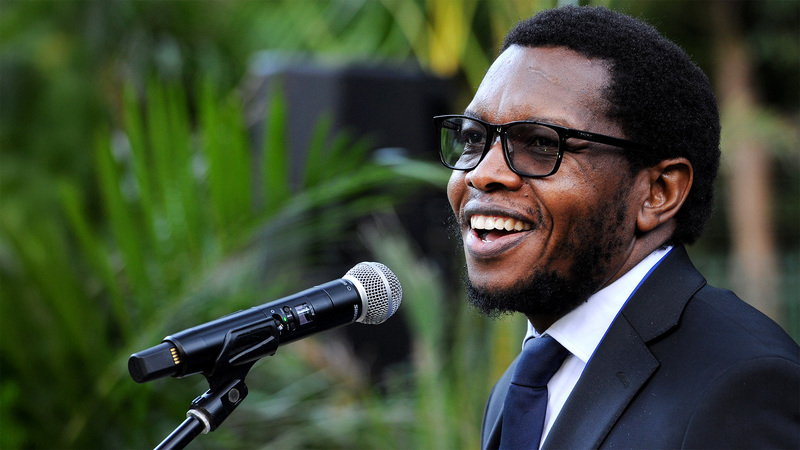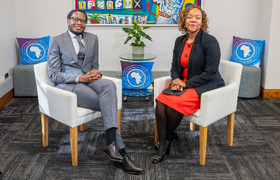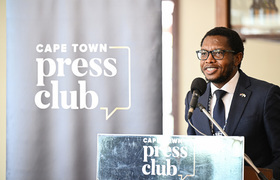‘It’s possible to do the impossible at UCT’
01 September 2025 | Story Kamva Somdyala. Read time 5 min.The University of Cape Town (UCT) is ready to position itself well during a period of global uncertainty – not just as an institution that prides itself in excellence, but one that prioritises solving societal problems. This was one of the takeaways from a candid interview UCT Vice-Chancellor Professor Mosa Moshabela had with seasoned journalist Nikiwe Bikitsha, to reflect on his first year in office.
“As a university we are a bedrock of talent, we value excellence. Our research has impact in the world … one of the reasons we are ranked the way we are. We need to be the first responders when society is faced with challenges. If society says we’ve got a loadshedding problem, we need to unleash our brain trust to help solve those. We can contribute based on the talent and expertise we hold. That for me is societal relevance, is legitimacy … is impact in society.
“Our society has many needs that are pressing and urgent that as universities we need to be part of the solution. The question is how are we as UCT going to contribute to the socio-economic landscape. That’s why innovation brings what we do much closer to solving problems in our communities, in partnership with government and civil society,” said Professor Moshabela.
Having spent the bulk of his first 12 months in office engaging with various stakeholders across the university, Moshabela said it’ll take everyone pulling together towards the same goal for UCT to rise beyond where it currently stands.
“It’s possible to do the impossible at UCT, and what it takes is people putting their heads together and holding hands. It’s hard work and requires a lot of engagements but once you hit a point where people start working together, things start happening,” said Moshabela. “I’m happy that we have been able to turn around the brand and reputation of UCT. We are seeing more people apply [to UCT] and that tells you something about the stability of the institution … it’s a collective effort and that is a measure of success.”
“There is an appetite … in different structures where I’ve engaged people, strong appetite for UCT to overcome the polarisation that is on campus. And that appetite we have to capitalise on because it represents the interests and commitment of the community to ensure that we can become a community that is united in purpose.”
UCT will use every available opportunity to remain a leading institution into the future. This future is underscored by attracting the best students, providing an enabling environment for them to thrive, and propelling ideals of innovation and entrepreneurship. These reasons, and several others, have given rise to Strategy 2030, a draft document which is now open for robust engagement, anchored squarely within Vision 2030. There is also an interactive survey relating to the strategy.
It will steer the institution and seal a prosperous future, which will come from its people. In this interview, Moshabela spoke about taking stock and taking charge.
“We can contribute based on the expertise we hold.”
Moshabela recalled that when he was finally installed as head of the institution, he had conversed with a diverse stakeholder group, including students, staff, donors and alumni. Part of the mission statement of Strategy 2030, in its draft form, reads: “UCT will continue to grow as the bedrock of talent, hallmark of excellence and home of innovation in Africa. UCT will bring together the most gifted of minds, challenge them with the most pressing and complex of problems, enable them to test the most promising of solutions, and do so with urgency and precision of time, then share these lessons and solutions with the country, the continent and the world at large for greater societal impact.”
This postulation puts students squarely at the centre of UCT’s future, something about which Moshabela is mindful. “People at UCT are talented and highly marketable. No one at UCT has to tolerate the discomfort of an environment that they have to work in. We need to treat each other well so that our talent can be retained.”

Collective effort
“When we set out to develop the strategy, I wanted every single person to see themselves in the strategy and if I can achieve that, I would have done 80% of the job. Balancing the interests of a diverse community is difficult but if we keep leaving certain people behind, then we are holding the institution back.”
Moshabela also used the conversation to touch on UCT’s future, the generations of people who have walked the campus and an abiding loyalty to the university. He said there should be a “commitment to UCT” rather than serving for one’s own benefit. Furthermore, he explained that ordinarily, there should be alignment between the two, failing which, one runs the unintended consequence “of putting the institution at risk”.
 This work is licensed under a Creative Commons Attribution-NoDerivatives 4.0 International License.
This work is licensed under a Creative Commons Attribution-NoDerivatives 4.0 International License.
Please view the republishing articles page for more information.












